Latest News
- Court Sentences Bank Employee To 5 Years For Embezzling 100,000...
- Fake ‘Sheikh’ Sentenced To 2-yr As Court Overturns Verdict
- Justice Ministry New Service On The Sahel App
- Ministry Probes 68 Cases Of Illegal Charity, Funds Collection
- Globally, Kuwait Is Among The Top Consumers Of Incense And Oud O...
- Decrease Seen In Foreign Investment
- Kuwait Customs Seized 2 Containers Laden With Tobacco At Shuwaik...
- Unpaid Salaries, Accountant Beaten Up By Workers
- The Sahel App Was Not Hacked, A Spokesman Claims
- Four Expats Arrested For Stealing Copper Cables Worth 60,000 Din...
- Indian National Died In Abdalli Car Accident
- Work Permits And Foreign Worker Transfers Are Amended By PAM
A Kuwaiti Medical Team Relieves The Pain Of Children Suffering From Malignant Retinal Stem Cell Cancer

While facing severe hurdles, a Kuwaiti medical team was able to relieve the anguish of a number of children suffering from a malignant condition (retinal cancer) at a time when countries throughout the world are commemorating International Children's Cancer Day in solidarity with them today, Tuesday.
The heroes of this story, according to Kuwait News Agency, are a Kuwaiti team specialized in the treatment of cancer (retinal stem cells) in children and infants, who established themselves and set an example in caring for and balancing the aches of their livers after intensive stages of treatment, microsurgeries, and examinations. According to the Al-Rai daily, they recorded an ideal experience that did not enable their youth to be abducted but rather proved that faith in the will of life and its Creator is enough for hope to triumph.
The team's success was due to the unique coronavirus (Covid 19) pandemic, especially since it was founded in an emergency situation with the pandemic's onset in February 2020 and the closing of airports, which prohibited sick children from flying abroad to obtain or complete their treatment.
Dr. Abdullah Al-Baghli, President of Al Bahar Eye Center, Chairman of the Council of Ophthalmology Departments, and Consultant Ophthalmologist described the formation of a medical team to treat this type of serious cancer as a "unique medical precedent" and a "great achievement" for the Ministry of Health and the State of Kuwait, as well as raising Kuwait's profile in international medical forums.
"We have formed an integrated team with very precise conditions to include all the required specialties, such as pediatric ophthalmology, retinal surgery, eye sockets, pediatric oncologists, and oncologists, radiotherapy, in addition to radiologists, pediatric neurologists, and physicians," said Dr. Adnan Al-Wael, team leader and head of the children's strabismus unit at Al Bahar Eye Center. In genetics, to treat and diagnose new instances, as well as to follow up on patients who had received treatment overseas prior to the Corona pandemic?"
Retinal stem cancer is one of the most dangerous types of cancer that affect children's retinal cells, according to Dr. Alaa Al-Ali, who is in charge of following up on the team's work. These tumors grow very quickly, indicating that failure to diagnose early and delay treatment could result in the child's death.
Al-Ali, who is one of the first Kuwaiti female doctors to specialize in retinal and vitreous surgery, children's eyes, and strabismus, said the team diagnosed and treated ten children ranging in age from three months to two years, as well as children who were receiving treatment abroad and are all in advanced stages of treatment.
Dr. Ahmed Boushahri, head of Unit C in the Kuwait Cancer Control Center's Department of Radiation Therapy and Oncology, said that radiotherapy techniques and methods for treating retinal stump cancer have advanced significantly and that the majority of cases that require radiotherapy intervention are advanced or non-advanced cases that respond to surgery and chemotherapy.
"Recently, an advanced instance of a girl was treated with advanced radiotherapy, and happily, her condition is stable, and there are no signs and effects of the sickness," Boushahri continued.
Dr. Fatima Dashti, consultant of pediatric neuroradiology at Ibn Sina Hospital, explained that magnetic resonance is used exclusively for diagnosis and follow-up of children's cases, with no CT scans performed so that children are not exposed to radiation.
It's worth noting that cancer (retinal stem cells) is a rapidly growing malignant tumor that only affects the retinal cells in children. Children's diseases are typically extremely different from diseases that affect adults' eyes, especially when one child out of every 17,000 is diagnosed with this type of malignancy.
Trending News
-
 Eid Al Fitr 2024: Crescent Moon Not Sighted In Sau...
08 April 2024
Eid Al Fitr 2024: Crescent Moon Not Sighted In Sau...
08 April 2024 -
 Kuwait Implements Home Biometrics Services Ahead O...
14 April 2024
Kuwait Implements Home Biometrics Services Ahead O...
14 April 2024 -
 When Will Eid Al Fitr 2024 Take Place In Qatar, Ba...
08 April 2024
When Will Eid Al Fitr 2024 Take Place In Qatar, Ba...
08 April 2024 -
 On Sunday, The Meteorological Department Warns Of...
07 April 2024
On Sunday, The Meteorological Department Warns Of...
07 April 2024 -
 Kuwait Airways Provides Update On Flight Schedule...
14 April 2024
Kuwait Airways Provides Update On Flight Schedule...
14 April 2024 -
 Kuwait Airways Introduces Convenient Home Luggage...
15 April 2024
Kuwait Airways Introduces Convenient Home Luggage...
15 April 2024 -
 Gathering For Eid Al-Fitr Prayers: Kuwaiti Citizen...
10 April 2024
Gathering For Eid Al-Fitr Prayers: Kuwaiti Citizen...
10 April 2024 -
 Winners Of Kuwait National Assembly 2024 Elections
06 April 2024
Winners Of Kuwait National Assembly 2024 Elections
06 April 2024 -
 An Egyptian Expat Dies At Kuwait's Airport
11 April 2024
An Egyptian Expat Dies At Kuwait's Airport
11 April 2024 -
 Bay Zero Water Park Kuwait: Summer Season Opens Ei...
11 April 2024
Bay Zero Water Park Kuwait: Summer Season Opens Ei...
11 April 2024












Comments Post Comment